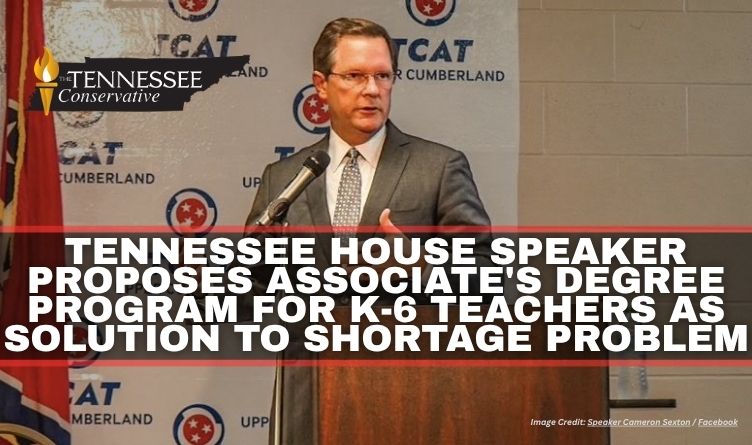Image Credit: Speaker Cameron Sexton / Facebook
The Tennessee Conservative [By Paula Gomes] –
House Speaker Cameron Sexton (R-Crossville-District 25) says he will propose an associate’s degree program for K-6 teachers when the legislature reconvenes in January. Sexton believes his “out of the box” idea could be a solution to Tennessee’s current teacher shortage.
Public school teachers are currently required to have a bachelor’s degree at a minimum and either be enrolled in or have completed an preparation program for educators.

Speaking to the Tennessee Firefly, Sexton would lower those standards by only making two years of higher education mandatory, along with an internship.
Under this plan, passing the Praxis exam would still be required. Only 67 percent of potential elementary teachers with a bachelor’s degree pass the Praxis when taking it for the first time but Sexton is confident that those with an associate’s degree in education would have similar, even better, pass rates.
Sexton says his plan may draw people to teaching who cannot afford a four-year degree, including retirees.
Envisioning a system similar to nursing, Sexton would not require participants in the new associate’s degree program to later earn their bachelor’s, although he believes many would do so anyway.
In Tennessee, you can become a licensed practical nurse by obtaining a GED, completing a 12-month program, followed by an internship. To become a registered nurse, you must get a bachelor’s, while nurse practitioners are required to obtain an advanced degree.
The Tennessee Conservative reached out to JC Bowman, President and CEO of Professional Educators of Tennessee, to get his take on the shortfall that the state is dealing with in regard to educators. Bowman told us that there are two key parts to the teacher shortage that must be addressed simultaneously: Recruitment and retention.
When it comes to recruitment, Bowman says there are a “myriad of issues” including that teaching has become an unattractive field and fewer people are interested in becoming educators. Those that do pursue a teaching degree and license do not see it as a long-term career.
“The demanding nature of the job, combined with inadequate systemic support, has created a workforce where many educators see their roles as temporary rather than lifelong commitments,” said Bowman. “The current state of the teaching profession is characterized by high turnover rates, low job satisfaction, and a decline in the number of new educators entering the field.”
As far as retention goes, Bowman says that many factors are at play. Teachers feel overwhelmed and unsupported, with poor student discipline contributing to overall working conditions.
While educator salaries and benefits are important, says Bowman, it’s not the major issue with regard to retention. However, in some cases, the salaries of veteran teachers are not keeping up with the rate of inflation.
To address retention, Bowman suggests that making it easier for retired teachers to return to classrooms could help. Bowman also supports changing the way the state trains teachers by looking, not at a nursing model as put forth by Sexton, but at how doctors are trained.
Tennessee could approach training in a similar fashion as the University of Michigan who rolled out a novel training program for teachers beginning in 2018.
In modeling their program after how doctors get trained, teachers continue their training through the first three years on the job as interns, supported by veteran teachers.
After completing student teaching, instead of looking for work at a different school, these new teachers, known as “residents” stay on for three years as full-time, fully certified educators while continuing to learn from professors and veteran teaching staff.

Bowman foresees the existing teacher shortage continuing to increase based on predicted growth, especially in special education, math, and science, and in schools that serve low-income students and English learners. Increasing the skills of paraprofessionals who work alongside teachers in critical roles in the classroom also needs attention.
“There is no magic bullet to ensure that all teachers are great before they begin teaching,” said Bowman. “However, we can make the effort to equip our educators with skills for a modern age. Change is on the horizon in how we prepare those who educate our children. Policymakers and stakeholders must collaborate to implement the necessary changes that benefit our students and ensure that quality educators enter and remain in the profession. Together, we can make schools a better place for teachers to work and our students to learn.”

About the Author: Paula Gomes is a Tennessee resident and reporter for The Tennessee Conservative. You can reach Paula at paula@tennesseeconservativenews.com.



5 Responses
Oh this is genius (please note my sarcasm)….dumb down the caliber of teachers to address a shortage problem??? Why not look at the reason we have a shortage problem?? And its not money…….People don’t want to be teachers today because we have swayed so far from actually educating our children and anyone that truly cares about kids and education know the system is messed up. We have a failing education system so what does the genius Speaker do? Put ill prepared teachers in the most crucial education years of a students education process. This is always their answer……when something doesn’t work dumb it down (2 year program) or throw good money after bad money (voucher program) and at the end of the day they do as they always do; they ignore and refuse to address the root cause of the problem because that would require too much work and frankly I don’t think we have people anymore that actually know how to educate kids. All they do is follow orders even when they know those orders are not going to produce positive results. And the end of the day all he and the Governor are doing is pushing the problem down the road to further failure.
AMEN!
The reason we are so short on teachers is the shot. It was mandatory for them and has done severe damage to their health if they didn’t die within the 10 day window. We must continue to bring this atrocity into the light so we do not let it happen again, which makes it so egregious for our President to give billions to big pharma, again, for more mRNA jabs. Stand up and speak out while you can.
Yup!
Who’d want to teach school? God and effective discipline have been barred. Plus “college” usually makes luciferian dimmercraps of students.